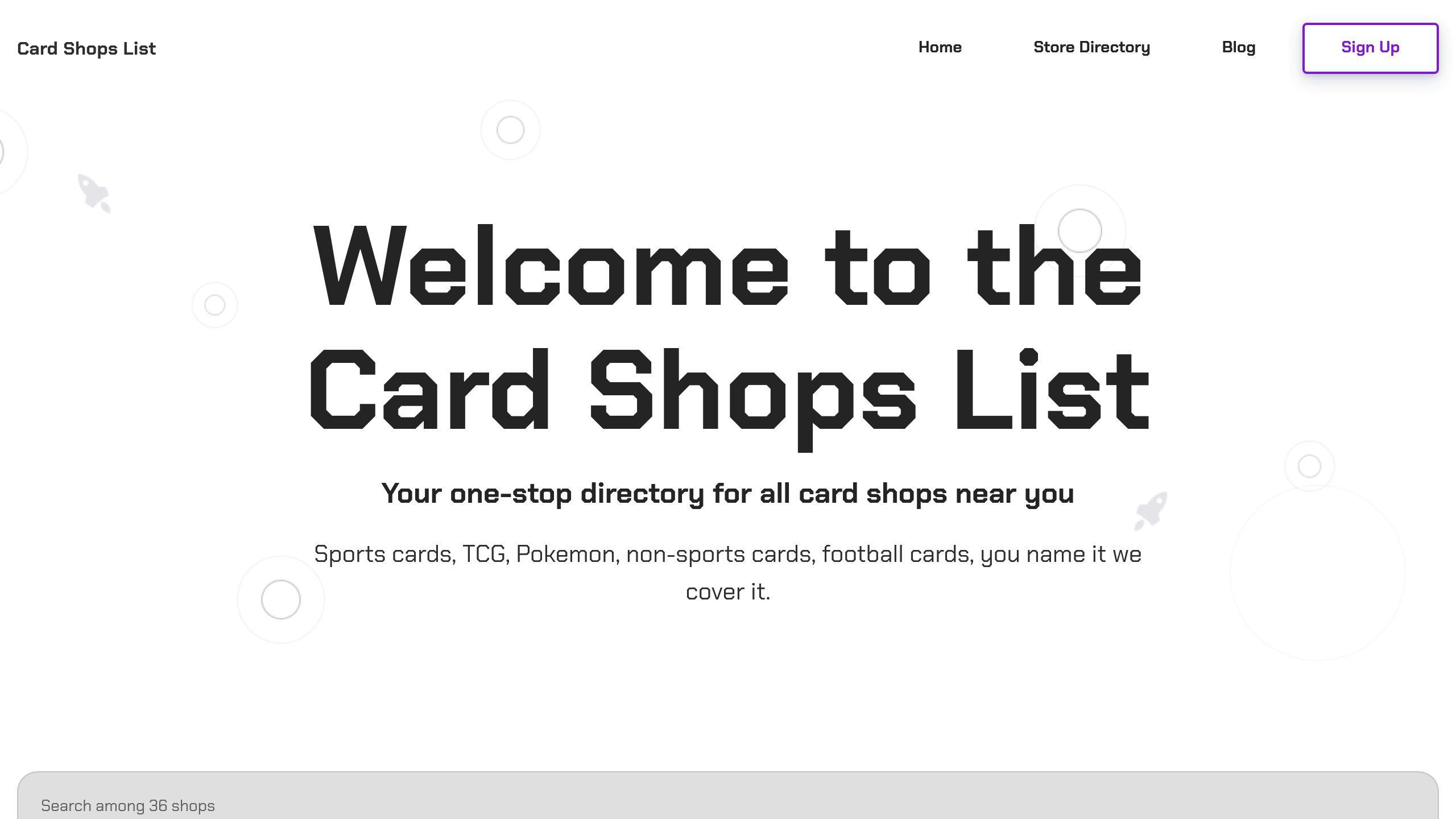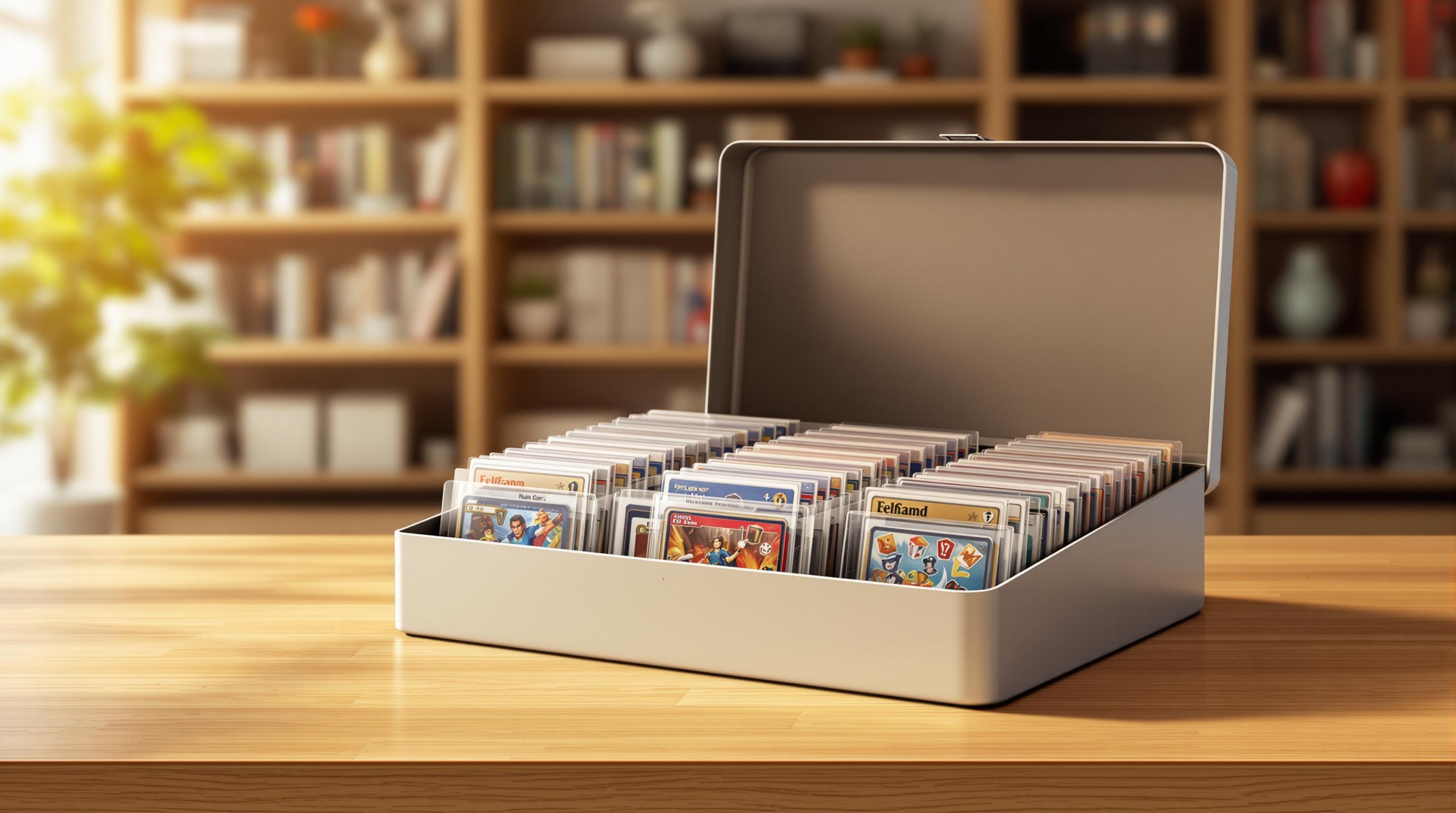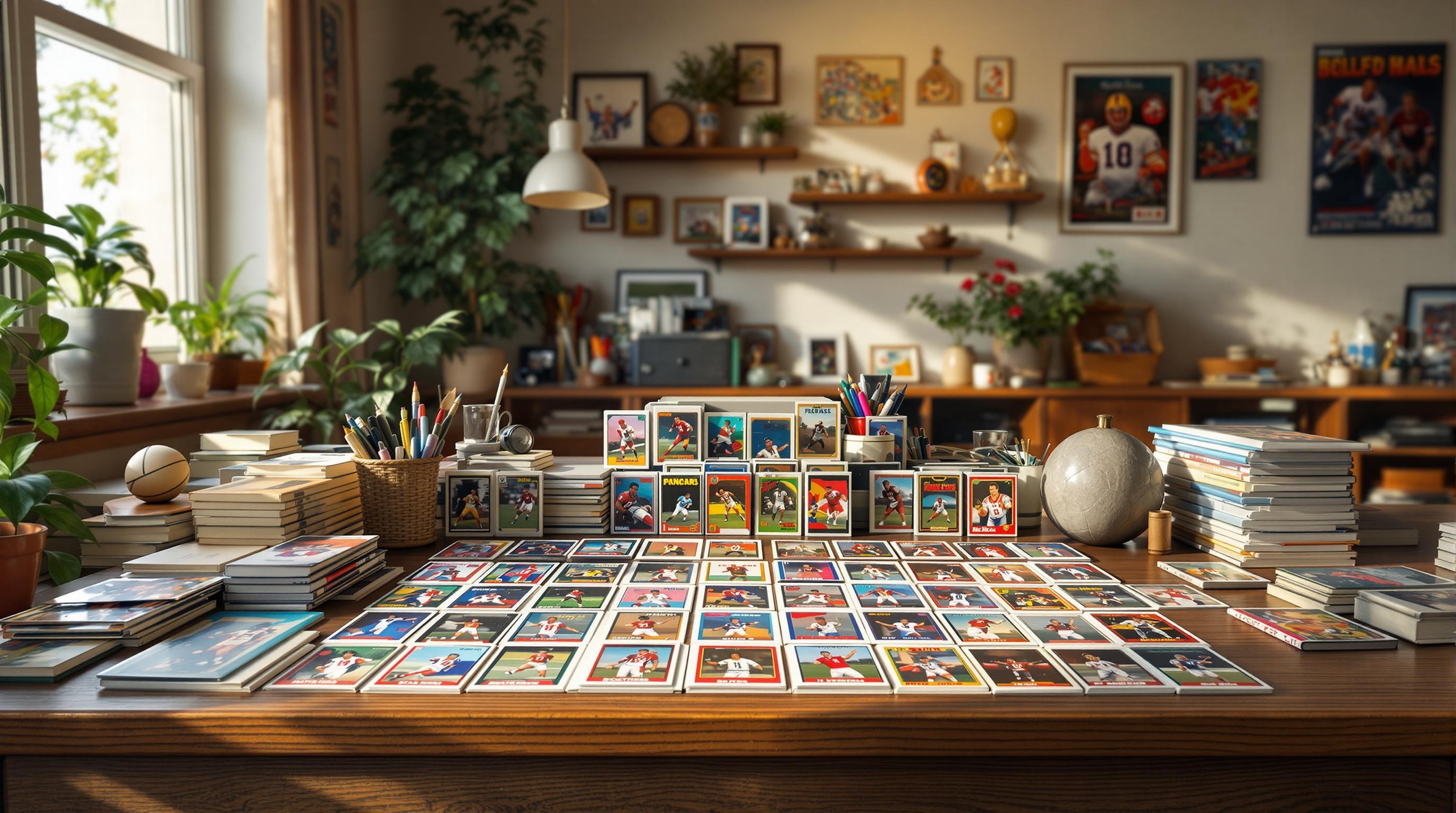: A Quick Guide
Card shops face several challenges that frustrate collectors. Here's how to fix the top issues:
-
Pricing Problems
- Use clear price tags
- Set market-based prices
- Keep prices consistent
-
Poor Customer Service
- Train staff on card knowledge
- Improve communication skills
- Create a welcoming atmosphere
-
Limited Store Hours
- Analyze foot traffic
- Consider split shifts
- Extend weekend hours
-
Card Availability
- Stock popular cards
- Manage inventory efficiently
-
Trading Rules
- Offer fair trade-in values
- Create flexible policies
Pro Tip: Use Card Shops List to find the best local shops that meet your needs.
By addressing these issues, card shops can boost sales and keep collectors happy. Remember, a well-run shop isn't just a store - it's a community hub for passionate collectors.
Main Customer Complaints
Card shops are where the magic happens for collectors, but they're not all sunshine and rainbows. Let's check out the top gripes people have when they visit their local card stores.
Price Issues
Pricing can be a real headache. Here's what one fed-up collector had to say:
"He has no prices up. So you'll ask him how much for the bowman '15? And he looks it up, on ebay I presume. Then he lumbers over, hands you your two packs. Then ask, how much for the 2016 TOpps update? Lumbers back to his computer, looks it up, lumbers back to hand you the packs. Eventually I just gave up and stopped."
Ouch. That's a $200 sale down the drain. It's a perfect example of how bad pricing can hit a shop where it hurts - right in the wallet.
Poor Customer Service
You'd think card shop staff would be all about the cards, right? Well, not always. Some customers complain that employees can't tell a Pokémon from a Magic card, or just don't seem to care.
Limited Store Hours
Ever rushed to a card shop after work, only to find it closed? You're not alone. Shops with tight hours are missing out on sales, especially if they're not open when most collectors have free time.
Card Availability
Getting your hands on popular cards can be like finding a needle in a haystack. One collector put it this way:
"It is currently pretty much impossible to find 'One Piece' cards in store. This is due to the rapid demand for them on the aftermarket."
And it's not just new releases. Check out this story:
"About a year or so ago I went to Target with my friends with the intent of buying Disney's new card game 'Lorcana.' When we got to the store there was a long line of people waiting in the card aisle. A poor employee had to give packs out one at a time just to make sure everyone got one."
Talk about frustrating!
Trading Rules
Some shops have trading rules tighter than a new pack of cards. Collectors often feel like they're getting a raw deal with low trade-in values and inflexible policies.
Fixing Price Problems
Card shop owners, let's talk pricing. It can make or break your business. Here's how to keep customers happy and your cash register ringing.
Clear Price Tags
No more guessing games for customers. Make your pricing crystal clear:
Get a label maker. It's a time-saver and keeps things consistent.
Try color-coding. Green for under $10, yellow for $10-$50, red for $50+.
Set a weekly price update schedule. It keeps you on top of market changes.
Clear prices build trust. When customers can see prices easily, they're more likely to buy without hesitation.
Market-Based Pricing
Stay competitive by staying informed:
Use pricing databases like Beckett for up-to-date card values.
Keep an eye on eBay and TCGplayer for real-time trends.
Hit up trade shows. They're great for understanding current market values.
Ben Burrows from clct says:
"For buyers, understanding the current market can help find the right deals at the right time."
Same goes for sellers. Know the market to price your cards right.
Keeping Prices Consistent
Price inconsistencies frustrate customers. Here's how to avoid that:
Use a POS system that syncs with your inventory management.
Train your staff on accessing and interpreting pricing info.
Have a price-matching policy. It shows you're confident and competitive.
These strategies create a fair pricing environment. It solves complaints and builds trust, leading to repeat business and good word-of-mouth.
Ben Burrows also notes:
"Many of the most successful card dealers recommend selling cards during the earliest stages of price decline and then reinvesting the money left over into another opportunity."
This keeps your inventory fresh and prices competitive.
Better Customer Service
Great customer service can turn browsers into loyal collectors. Here's how card shops can step up their game:
Staff Training
Knowledge is key in the collectibles world. Boost your team's expertise:
Card Camp: Run regular training on new releases, market trends, and grading standards. Dave & Adam's Card World in New York holds monthly "Card Camps" covering everything from vintage baseball to the latest Pokémon sets.
Customer Service Skills: Practice handling complaints and explaining card conditions. The Collector Store in Texas saw 30% fewer customer complaints after weekly role-playing exercises.
Product Passion: Let staff build their own collections. Card Kingdom in Seattle gives employees a monthly $50 store credit. The result? More engaging customer chats.
Customer Communication
Clear, friendly talk can make or break a sale. Polish those people skills:
Active Listening: Teach staff to really hear customers. The Baseball Card Store in Chicago uses a "Repeat and Confirm" policy. Staff sum up the customer's request before acting. This simple step cut misunderstandings by 40%.
Speak Their Language: Not everyone knows card lingo. Train staff to gauge a customer's knowledge and adjust. Dave & Adam's Card World saw 25% more new collector sales after introducing "Beginner-Friendly" communication training.
Problem-Solving Power: Let staff make on-the-spot decisions. While not for every shop, this trust can spark creative solutions.
Making Shops More Friendly
A welcoming vibe can turn a quick visit into a treasure hunt:
Community Corner: Set up a trading table. Card Shop X in Portland saw 35% more foot traffic after starting "Trade Tuesdays" with free snacks.
Kid-Friendly Zones: Create a space for young collectors. Collector's Cache in Kansas City added a "Junior Collector's Corner" with lower shelves and budget options. Family visits jumped 50%.
Staff Showcase: Display employee collections. It's a great chat starter. The Dugout in San Francisco rotates employee collections monthly, boosting customer engagement by 20%.
sbb-itb-0db97a5
Running a Better Shop
Want to turn your card shop into a collector's dream? Let's look at some real-world tactics that work.
Organizing Cards
Ever felt lost in a card shop? Good organization isn't just about neatness - it's about boosting sales.
Pandemonium Games & Hobbies in Cambridge, MA, sorts bulk singles by color, then alphabetically. It's like a color-coded roadmap for collectors.
Level Up Games & Comics takes a different route. They organize by set, then alphabetically. This method cut their search times by 40% and pumped up sales of older sets by 25%.
Pro tip: Get some BCW 800 Count 2 Piece Storage Boxes. They're popular for a reason. Stack them on solid metal racks, and you've got an easy-to-navigate wall of cards.
For the high-value cards, Level Up uses Magnetic Card Holders in glass cases. This showcase approach bumped up their pricey card sales by 15%.
Better Store Hours
You can't sell if you're closed. Sounds simple, but many shops get this wrong.
Track your foot traffic. Use a basic tally system or get a foot traffic counter. A Portland shop found that staying open two hours later on Fridays boosted weekend sales by 30%.
Think about split shifts. Open from 11 AM to 2 PM, close for a bit, then reopen from 5 PM to 9 PM. A Chicago shop tried this and saw 20% more after-work customers.
Don't slack on weekends. That's when collectors come out to play. A Seattle card shop extended Saturday hours and saw weekend revenue jump 40%.
Faster Checkout
Long lines kill sales. Let's speed things up.
Upgrade your POS system. Clover's EMV system processes chip cards in under three seconds. That's fast.
Go mobile. Give your staff mobile POS devices. A New York City shop did this and slashed checkout time by 60%.
Set up an express lane for folks buying five items or fewer. A Los Angeles store tried this and cut overall wait times by 25%.
Using Card Shops List

Card Shops List is a collector's best friend. It's like Google Maps, but for card enthusiasts. Whether you're after vintage baseball cards or the latest Pokémon set, this directory points you in the right direction.
Finding Shops on Card Shops List
Here's how to squeeze every drop of value from Card Shops List:
1. Get specific with your search
Don't just type "cards." If you're after Yu-Gi-Oh!, say so. Need grading services? Include that in your search. The more specific you are, the better your results.
2. Location, location, location
Whether you're in the Big Apple or Small Town, USA, Card Shops List can find nearby shops. No more aimless driving around town.
3. Know before you go
Card Shops List tells you what each store offers. Buying, selling, trading, card breaks - it's all there. This saves you from showing up with a stack to sell, only to find out the shop doesn't buy.
4. Read the fine print
Shop profiles often spill the beans on specialties. One might be a sports memorabilia haven, another a Magic: The Gathering paradise. A quick read can save you a wasted trip.
Why Use a Shop Directory?
Using Card Shops List isn't just convenient - it's smart collecting. Here's why:
Uncover hidden treasures: That mind-blowing shop you've been dreaming of? It might be just around the corner. Card Shops List helps you find these local gems.
Time and gas saver: Plan your card hunt like a pro. No more zigzagging across town hoping to stumble upon the right shop.
Compare and conquer: Need a place that buys collections? Or hosts tournaments? Card Shops List lets you size up shops side-by-side. Find your perfect match without the legwork.
Stay in the loop: The card shop scene is always changing. New stores pop up, others close, and some switch up their game. Card Shops List is your ticket to staying current.
Summary
Let's look at how card shops can level up their game and why customer feedback is a big deal.
Key Solutions
Here's how card shops can transform their business:
Pricing Strategy: Keep it clear and consistent. Dave & Adam's Card World saw sales jump 30% after they started using market-based pricing and clear labels.
Customer Service: Train your staff well. The Baseball Card Store in Chicago cut down misunderstandings by 40% with their "Repeat and Confirm" approach.
Shop Organization: Level Up Games & Comics boosted sales of older sets by 25% by organizing cards by set, then alphabetically.
Store Hours: A Portland shop made 30% more on weekends by staying open later on Fridays.
Checkout Efficiency: A New York City shop cut checkout time by 60% with mobile POS devices.
Using Customer Feedback
Customer feedback is like finding a rare card in a pack. Here's how to use it:
Regular Surveys: Collector's Cache in Kansas City does monthly surveys. They added a "Junior Collector's Corner" based on feedback and saw 50% more families coming in.
Social Media Monitoring: Card Kingdom in Seattle keeps an eye on what people say online. Their online reputation score went up 25% because of it.
Mystery Shoppers: The Dugout in San Francisco uses mystery shoppers to spot issues. It's helped them boost customer satisfaction by 35%.


